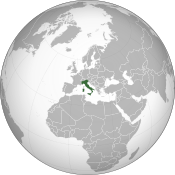Subject of high-profile Italian euthanasia case dies
Tuesday, February 10, 2009
Eluana Englaro, who had been in a persistent vegetative state since 1992 following an automobile accident, died Monday at the "La Quiete" clinic in Udine, where doctors stopped feeding her four days ago. The case has sparked a debate about euthanasia, as well as a political crisis.

Image: Englaro family.
Euthanasia is illegal in Italy, however, refusing treatment is not. On Friday doctors removed her feeding tubes in accordance with a November 2008 ruling by the Constitutional Court of Italy that it was within her father's rights to order the cessation of feeding.
Eluana's father, Beppino Englaro, fought a ten-year battle to remove his daughter's feeding tubes. He and Eluana's friends testified that this would have been according to her own wishes.
Beppino Englaro delivered the news of Eluana's death by telling ANSA: "Yes, she has left us, but I don't want to say anything, I just want to be alone."
In an interview with The Guardian last week, Beppino Englaro said: "If she couldn't be what she was [before the 1992 accident] then she would not have wanted to live."
In the last days of Eluana's life, the Italian government, led by Prime Minister Silvio Berlusconi, sought to intervene to save her life. The Vatican backed the government's position.
At the time of her death, the Italian Senate was working on a law to force doctors to resume feeding Eluana. When her death was announced, the Senate held a moment of silence as a sign of respect. The legislation is continuing and could affect future right-to-die cases.
Berlusconi said that he felt "deep pain and regret" for not saving her life. On Sunday, he said, "I can guarantee on my honour and that of my ministers, that our decision was based on moral principles and there was never a plan to attack anybody."
Friday, Berlusconi had attempted to issue a decree to prevent the feeding tubes from being removed. This was however rejected by President Giorgio Napolitano who said it violated high court orders, triggering a constitutional crisis.
Massimo D'Alema of the opposition party, Democratic Party of the Left, criticized the Prime Minister. "Berlusconi has little knowledge of the constitutional culture," he said. "He is a bully who wants to question the president's constitutional democratic powers."
| I am helping a person achieve her own wish, a defenseless person who was betrayed by everyone except her father and a few other people. | ||
—Dr. Carlo Alberto Defanti | ||
The Italian Minister of Health Maurizio Sacconi attempted to halt the proceedings on a technicality. According to his office, the court had specified for Eluana Englaro to die in a hospice, which the "La Quiete" clinic technically is not.
Eluana Englaro's long-time neurologist, Carlo Alberto Defanti, had erroneously predicted that she would survive another eight to ten days.
"Apart from her brain injuries, Eluana is a healthy woman. She has never been ill and never took antibiotics," said Dr. Defanti on Sunday. "It was something we did not foresee," he said of her death on Monday.
Defanti said he did "the right thing... I am helping a person achieve her own wish, a defenseless person who was betrayed by everyone except her father and a few other people."
Professor Antonio de Monte, an anesthesiologist who also provided care for her said: "Eluana died 17 years ago."
At Sunday's noon blessing, Pope Benedict XVI said, without direct reference to the case, "Let us pray for all the sick, especially those most seriously ill, who cannot in any way provide for themselves, but are totally dependent on the care of others. Let each of them experience, in the care of those who are near them, the power of God's love and the wealth of his saving grace."
According to The Times, opinion polls showed the people of Italy to be evenly divided 47/47, with 6 percent undecided, on the issue.
Beppino Englaro and observers have called Eluana "Italy’s Terri Schiavo" in reference to the United States Terri Schiavo case in 2005, which resulted in Terri, who was also in a vegetative state, being allowed to die after attempted legislative intervention.
Related news
- "Terri Schiavo dies" — Wikinews, March 31, 2005
- "Terri Schiavo's father makes appeal to have feeding tube reinserted" — Wikinews, March 25, 2005
- "Bush signs historic Schiavo bill into law" — Wikinews, March 21, 2005
Sources
- Richard Owen. "'Right to die' coma woman Eluana Englaro dies" — The Times, February 9, 2009
- "Italian woman at heart of euthanasia debate dies" — CBC News, February 9, 2009
- Silvia Alosi. "Inspectors visit clinic in Italy right-to-die case" — Reuters, February 9, 2009
- Nicole Winfield. "Italy govt. tries new tactic in right-to-die case" — Associated Press, February 9, 2009
- "Italian Senate tries to halt mercy killing" — Agence France-Presse, February 9, 2009
- Silvia Aloisi, Reuters. "Italy's PM seeks law to keep comatose woman alive" — International Herald Tribune, February 8, 2009
- Michael Day. "Italy faces constitutional crisis over coma woman" — guardian.co.uk, February 8, 2009
Sister links
 Eluana Englaro on Wikipedia.
Eluana Englaro on Wikipedia. Euthanasia on Wikipedia.
Euthanasia on Wikipedia.



